Washington: US space agency NASA Friday said that its Lunar Reconnaissance Orbiter (LRO) spacecraft has imaged a new crater on the Moon’s surface that is likely the impact site of Russia’s Luna 25 mission.
Luna-25, which took off atop a Soyuz-2.1b rocket from the Vostochny launch facility in Russia at 2.10 a.m. Moscow time (4.40 a.m. IST) August 11, TASS news agency reported.
Russia’s Luna Lander mission, which launched August 11 was expected to be on the Moon’s South Pole along with India’s Chandrayaan-3. However, during its descent, Luna 25 experienced an anomaly that caused it to impact the surface of the Moon August 19.
Roscosmos, Russia’s space agency, published an estimate of the impact point August 21.
LRO’s most recent “before” image of the area was captured in June 2022; thus, the new crater formed sometime after that date. Since this new crater is close to the Luna 25 estimated impact point, the LRO team concludes it is likely to be from that mission, rather than a natural impactor.
“The new crater is about 10 metres in diameter and is located at 57.865 degrees south latitude and 61.360 degrees east longitude at an elevation of about minus 360 metres,” NASA said.
“The impact point was on the steep (greater than 20-degree grade) inner rim of Pontecoulant G crater, about 400 kilometres short of Luna 25’s intended landing point at 69.545 degrees south, 43.544 degrees east,” it added.
Russia aimed to return to the Moon with its Luna 25 lander mission after 47 years. Its last lunar mission, Luna-24 was launched in 1976, during the former Soviet Union period.
Meanwhile, Roscosmos has planned Luna-26 for 2027 and Luna-27 for 2028, Luna-28 in 2030 or later. The country is also aiming at a manned mission and the construction of a lunar base, along with other countries such as the US, India and China.
